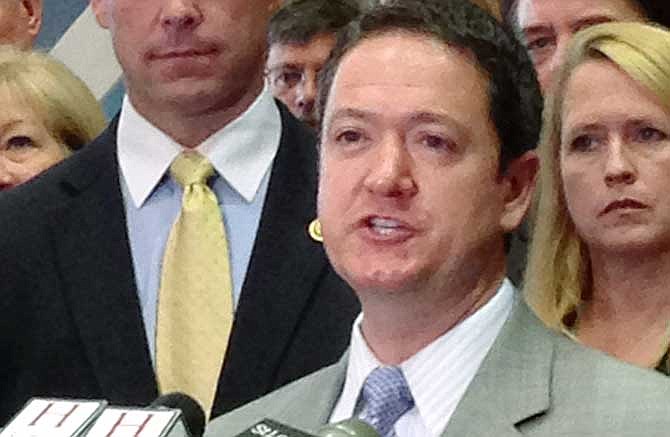Missouri Senate President Pro Tem Tom Dempsey and House Speaker Tim Jones signed their names nearly 200 times Friday morning, completing the process of sending Gov. Jay Nixon the bills that lawmakers "truly agreed and finally passed" during the final two weeks of the legislative session.
Now the governor has until mid-July to veto them, sign them into law or let them become law without his signature.
The Missouri Constitution requires the process. Until he has received the signed bills, the governor can't take any official action.
So, even though Nixon already has announced his intention to veto what's known as the "schools transfer" law, he has not, yet, officially rejected it because that bill was among the 183 measures that Dempsey and Jones signed Friday.
A 1956 Missouri Supreme Court case said the House speaker or Senate president pro tem can't block a bill he doesn't like by not signing it.
In 1955, then-House Speaker Roy Hamlin, D-Hannibal, assigned a Senate-passed bill to an unfriendly committee, and the chairman locked the original bill in a filing cabinet and scheduled, but never held, a hearing on it.
The bill authorized a tax on cigarettes for public school purposes - if voters approved that tax at an Oct. 4, 1955, referendum.
Although the committee never held a hearing, House members used a provision of the 1945 Constitution - the one Missouri still uses - to pull the bill from the committee and schedule it for debate.
When the original copy of the bill couldn't be found, an "authenticated" copy was used in the House, which amended and then passed it, sending it back to the Senate. On May 31 - the last day of the 1955 session - the Senate passed the amended version of the bill.
After Senate President Pro Tem Edward V. Long signed the bill, Speaker Hamlin refused, saying the measure the House passed wasn't the "original perfected copy."
Voters overwhelmingly approved the additional tax in the October election, and a St. Louis couple then asked the courts to declare the new law unconstitutional. They argued the speaker had not signed the bill as the Constitution required, and that the "lost" original copy had not been used in the House process.
In a unanimous opinion released May 14, 1956, the Missouri Supreme Court ruled the tax was a law because voters had approved it and the governor had declared it passed.
"It is generally recognized that the purpose of requiring legislative enactments to be signed by the presiding officers is to provide a "mode of authentication' evidencing the fact that a particular bill has been passed in due form by the legislative body involved," the court said.
The judges also noted the Constitution says a law is "finally passed" when "a majority of the members elected to each house be recorded as voting favorably." And, the court added: "It will be noticed that this definition of passage does not include signing by the presiding officers."
Now the governor has until mid-July to veto them, sign them into law or let them become law without his signature.
The Missouri Constitution requires the process. Until he has received the signed bills, the governor can't take any official action.
So, even though Nixon already has announced his intention to veto what's known as the "schools transfer" law, he has not, yet, officially rejected it because that bill was among the 183 measures that Dempsey and Jones signed Friday.
A 1956 Missouri Supreme Court case said the House speaker or Senate president pro tem can't block a bill he doesn't like by not signing it.
In 1955, then-House Speaker Roy Hamlin, D-Hannibal, assigned a Senate-passed bill to an unfriendly committee, and the chairman locked the original bill in a filing cabinet and scheduled, but never held, a hearing on it.
The bill authorized a tax on cigarettes for public school purposes - if voters approved that tax at an Oct. 4, 1955, referendum.
Although the committee never held a hearing, House members used a provision of the 1945 Constitution - the one Missouri still uses - to pull the bill from the committee and schedule it for debate.
When the original copy of the bill couldn't be found, an "authenticated" copy was used in the House, which amended and then passed it, sending it back to the Senate. On May 31 - the last day of the 1955 session - the Senate passed the amended version of the bill.
After Senate President Pro Tem Edward V. Long signed the bill, Speaker Hamlin refused, saying the measure the House passed wasn't the "original perfected copy."
Voters overwhelmingly approved the additional tax in the October election, and a St. Louis couple then asked the courts to declare the new law unconstitutional. They argued the speaker had not signed the bill as the Constitution required, and that the "lost" original copy had not been used in the House process.
In a unanimous opinion released May 14, 1956, the Missouri Supreme Court ruled the tax was a law because voters had approved it and the governor had declared it passed.
"It is generally recognized that the purpose of requiring legislative enactments to be signed by the presiding officers is to provide a "mode of authentication' evidencing the fact that a particular bill has been passed in due form by the legislative body involved," the court said.
The judges also noted the Constitution says a law is "finally passed" when "a majority of the members elected to each house be recorded as voting favorably." And, the court added: "It will be noticed that this definition of passage does not include signing by the presiding officers."

